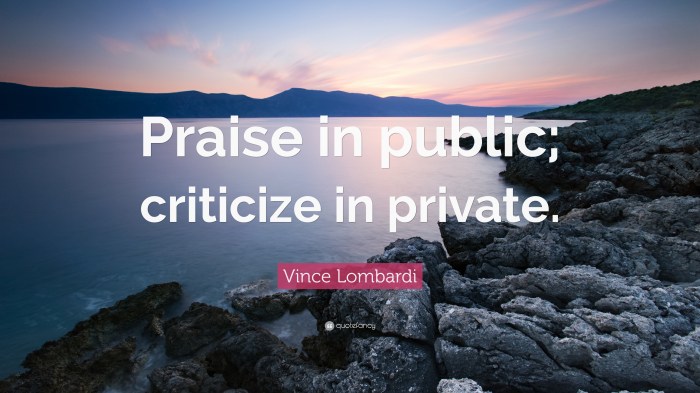Praise in public criticize in private quotes – In the realm of interpersonal communication, the adage “praise in public, criticize in private” has stood the test of time. This principle underscores the importance of recognizing and acknowledging individuals’ accomplishments in a public setting while offering constructive criticism in a private and respectful manner.
Throughout history, this approach has proven its effectiveness in fostering positive relationships, maintaining a productive work environment, and promoting personal growth. By understanding the origins, benefits, and effective implementation of this principle, we can harness its power to enhance our communication skills and foster a culture of appreciation and improvement.
Historical Origins and Significance

The phrase “praise in public, criticize in private” has its roots in the teachings of Chinese philosopher Confucius. Confucius believed that public praise could boost morale and encourage individuals to continue striving for excellence, while private criticism allowed for constructive feedback to be delivered in a safe and supportive environment.
This principle has endured over time due to its effectiveness in fostering positive relationships, promoting growth, and maintaining a healthy work environment.
Benefits of Public Praise and Private Criticism

Public Praise, Praise in public criticize in private quotes
- Boosts morale and motivation
- Fosters a positive work environment
- Recognizes and rewards effort
- Encourages collaboration and teamwork
Private Criticism
- Provides constructive feedback
- Preserves dignity and relationships
- Encourages growth and development
- Builds trust and strengthens communication
Effective Implementation of the Principle
Public Praise, Praise in public criticize in private quotes
- Be sincere and specific
- Focus on the behavior or accomplishment
- Avoid exaggeration or flattery
- Deliver praise promptly
Private Criticism
- Choose a private and comfortable setting
- Be respectful and non-confrontational
- Focus on specific and actionable feedback
- Provide suggestions for improvement
Exceptions to the Rule: Praise In Public Criticize In Private Quotes
While the principle of “praise in public, criticize in private” is generally effective, there may be situations where it is necessary to deviate from this approach.
- When immediate feedback is required to address a critical issue
- When public criticism is necessary to deter similar behavior
- When the individual being criticized has a history of disregarding private feedback
Cultural Variations

The principle of “praise in public, criticize in private” varies across different cultures.
- In individualistic cultures, public praise is more common, while private criticism is seen as more appropriate.
- In collectivist cultures, private praise and criticism are both valued to maintain group harmony.
It is important to be aware of cultural differences when applying this principle to ensure effective communication.
Commonly Asked Questions
What are the historical origins of the phrase “praise in public, criticize in private”?
The origins of this phrase can be traced back to ancient Greek philosophy, particularly the teachings of Aristotle and Plato. They emphasized the importance of public recognition for fostering virtue and maintaining social harmony.
Why is public praise so effective in boosting morale?
Public praise serves as a powerful motivator because it acknowledges an individual’s efforts and contributions, creating a sense of appreciation and belonging. It reinforces positive behavior and encourages individuals to strive for excellence.
What are some best practices for delivering public praise?
When offering public praise, it is important to be sincere, specific, and timely. Focus on recognizing specific accomplishments and behaviors, and avoid excessive or generic praise. Ensure that the praise is delivered in a genuine and heartfelt manner.
What are some situations where it may be necessary to deviate from the “praise in public, criticize in private” approach?
In certain situations, such as when dealing with sensitive or highly confidential matters, it may be more appropriate to offer both praise and criticism in private. This ensures privacy and allows for a more focused and constructive discussion.